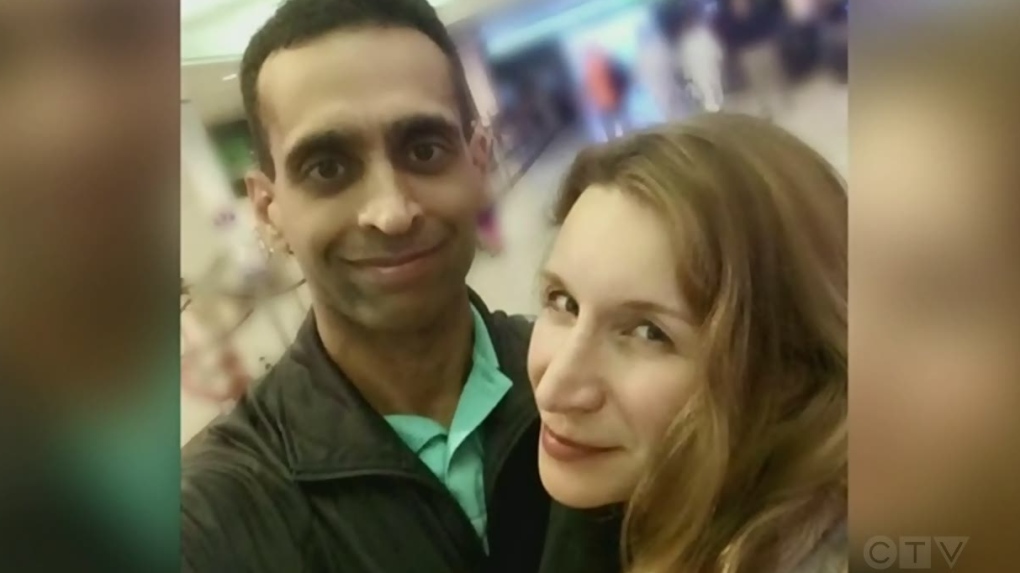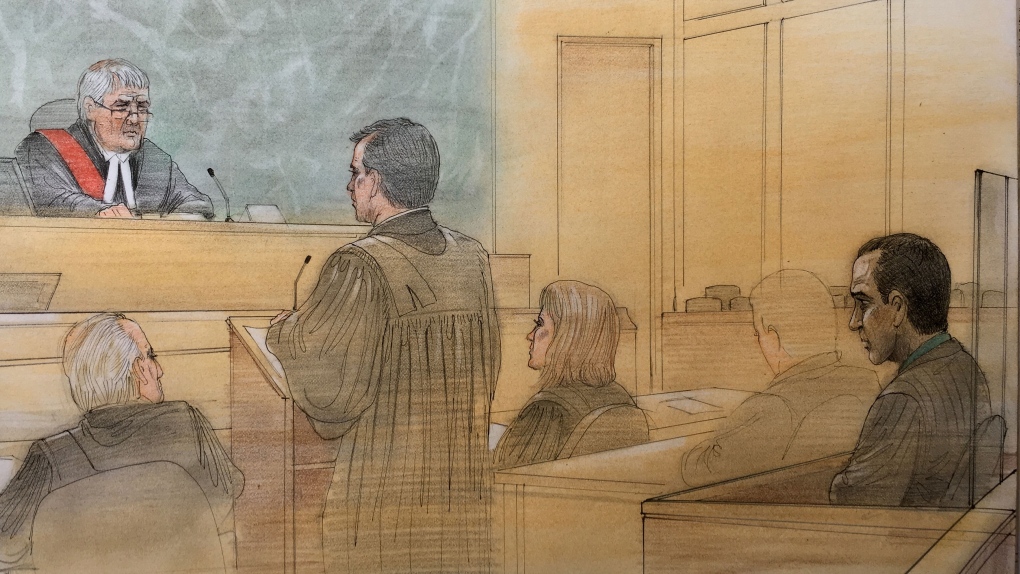Detective who solved murder of Ontario doctor says killer made big mistake trying to hide his crime
The lead detective on the horrific murder of an Ontario doctor says the killer made one big mistake when trying to cover up the crime, leaving investigators a calling card that led them straight to his door.
The homicide officer who solved the Doctor Elana Fric-Shamji murder wonders if the well-respected family doctor would still be alive today if friends and colleagues had spoken up about the domestic abuse in the Toronto home.
"All of her friends, all doctors, highly-educated successful people at the height of their careers as well, they knew or suspected that she was being physically abused by her husband and said nothing," Steve Ryan, now a crime analyst at CP24, said in this week’s episode of CTV News Toronto’s podcast The Detective.
- New episodes of The Detective are available Mondays on iHeart.
Fric-Shamji's husband, renowned neurosurgeon Mohammad Shamji, is serving a life sentence for beating and strangling his wife, then stuffing her body in a suitcase and throwing it into a river north of the city.

"Physical abuse, domestic abuse has no limits," said Ryan. "It doesn't matter if you are poor, uneducated, or you have lots of money. Unfortunately, no one spoke out and let it be known she was being abused as badly as she was."
Shamj killed his wife in their North York bedroom in the winter of 2016, after she told her husband of 12 years that she wanted to end their marriage.
“The night that she was killed was the night that she served her husband with the divorce papers, letting him know that it was over,” Ryan said.
Ryan says Fric-Shamji’s mother, Ana Fric, was concerned for her daughter’s safety and tried to help with the divorce process.
“Elana’s mom called her from Windsor and said ‘I’ll come down with you when you serve him those papers,’ because her mom had this sort of feeling that this was not going to go right,” Ryan said.
“I’ll quote the mom, she said to me, what Elana said to her, was ‘Mom, he’s not going to kill me, you don’t need to come from Windsor, I’m just serving him with papers’ and look what happened.”

Neither were happy in the marriage and both were having affairs — Fric-Shamji with a fellow doctor.
Ryan says after her murder, the detective had to contact the doctor and his wife, who knew nothing about the affair.
It was Fric-Shamji’s mother who filed the missing person report with police. Detectives then interviewed her husband.
“He said the last time he saw her was that Wednesday night when she left with her boyfriend. He provided us with a name and we had to follow up on that, as uncomfortable as that was, you always have to look at your alternate suspects,” Ryan said.
This was before Fric-Shamji’s husband was charged with her murder, and at the time, was pointing the finger of blame at his wife’s lover, something Ryan says Shamji’s defence lawyers would quickly try to exploit at trial.
“As a homicide detective, you need to look down the road. What is going to be the defence? Is it going to be, I didn’t do it, this guy did it? So we had to contact him and as you can imagine he was quite upset because his wife didn’t know what was going on and he provided us with an alibi, but then we had to talk to his wife."

If Shamji’s defence would be blaming his wife’s lover, he would need an airtight alibi, but the doctor wanted to keep the affair from his wife.
“So we gave him a bit of time to speak with his wife and settle that with her and then we had to talk with her because we needed an alibi from him,” Ryan said.
“He was upset when we contacted him but I said to him if we don’t do this now, you are going to be the prime suspect come trial time. You’ll be in the witness box forever. They are going to accuse you of all kinds of things, so we need to firm up your alibi right now.”
After the body in the suitcase was dumped, the homicide cop says Shamji tried to steer police away from him, trying to keep everything as normal as possible even going so far as to call a divorce lawyer.
“He comes home makes breakfast for the kids, he takes them to school and he goes to work, sees patients. Later that day, he leaves a voice mail for a divorce lawyer. In which he says, and I am paraphrasing, ‘My wife wants a divorce. I’m going to give her half of everything I’ve got. Here’s my name, call me’ and he hangs up the phone.”
From the outside, Ryan says the Shamji’s appeared to have an idyllic life.
Both well respected doctors, living in an upscale North York neighbourhood dotted with bungalows and rebuilds where bungalows used to be. The Shamji home was a two-storey brick-and-stone rebuild.
“This is the house, a big beautiful house like this,” Ryan says, pointing to the home that is now occupied by new owners.
“One of the things a homicide officer will tell you is that you quickly learn that things are not always as they appear. For instance, you look at this big beautiful house you’ve got a couple, attractive couple both at the height of their careers, both doctors, successful doctors. Three beautiful kids, they’re the envy of a lot of people. But she was living a life of hell with regards to what he was doing to her as far as abusing her over and over again.”
The children thought the violence in the home was normal, that all families experienced and that it would get better.
There are three children, two girls and a boy. But it was the eldest girl, 11-years-old at the time, who witnessed part of the violent attack on her mother.
“The one daughter, her bedroom backed onto her mom and dad’s, so she heard the fighting that was going on. In fact, she came out of her room, stood into the entrance of her parents' room and she saw her dad on the floor on his hands and knees,” Ryan said.
“She couldn’t see her mom, but she could see her dad. Her dad was between the bed and the window, on one side of the bed. I believe he was assaulting her or choking her at that point from the position the daughter described at the time."
"She said ‘What is going on? Where is mom?' and her father said ‘Go back to your room, it's okay.’ She went back to her room, and then she heard rustling in the closet, as it turns out he was getting the suitcase. That is exactly what his daughter heard.”
Shamji would then stuff his wife’s badly beaten body into the suitcase and load her into his car, trying to find a place to dump the body.
“You’d be surprised by how a body can bend and twist. This suitcase, this woman was put into, was not that big, but he managed.”
The former investigator says it was obvious the killer did not have a plan in place and when they searched his cell phone records, it showed him driving all over the back country trying to find a location to get rid of the body.
“Picture this” Ryan said. “He’s got his dead wife in his car and he is looking to dump her body. We had him all the way over at Highway 50, driving down 50 coming along Nashville Road. I guess he just picked the spot because he’s heading to the Highway 27 and he is heading back home. So this spot I think he picked just out of pure panic and he just tossed her body over the bridge.”
Ryan, who worked for 13 years in Toronto’s Homicide Squad, recently returned to the bridge in Kleinberg, an hour north of Toronto, where Shamji threw a suitcase and his now-dead wife into the Humber River.
“One tries to dump a body, I just say this based on people I’ve interviewed in the past, where they can not be found, but clearly they can be found in the Humber River. Given the fact that this man was a neurosurgeon, brilliant academically, he was not so brilliant in knowing how to cover up a crime “
The body was discovered the same day Shamji disposed of it.
“So a fireman, I believe, was walking his dog down here and he came across the suitcase the morning after she’d been dropped over the bridge and he called the police because he found it suspicious. Police attended, opened the suitcase and found this badly beaten body of a woman in a suitcase. So they began their investigation to try and identify who she was.”
In his haste to get rid of his wife’s body, the neurosurgeon made a big mistake and left investigators a calling card.
“Her name, believe it or not, was on the suitcase and her address was on the suitcase. Again that goes back to the panic that he was in. He clearly thought none of this through because everything he touched was a clue for us. He left his wife’s dead body in a suitcase with her name and address on.”
It led homicide straight to his door, says Ryan.
But first, Ryan says they needed to have family formally identify the body.
The fact that her name was on the suitcase did that make it easier for everyone? I asked the detective.
“We knew what we were working from at that point in time. We still had to do an identification, so we have her name. And we had mom who gave us her daughter’s name, which matched on the suitcase. We still had to show mom a picture of her. So we show her a picture because we needed to know one way or the other is it her daughter or isn’t it. We showed her a picture of her daughter from the morgue from her chest up and she was almost unrecognizable. But her mom didn’t recognize her.”
“I’ll never forget when her mom saw that picture she dropped on her knees and said ‘That’s not her, it doesn’t look like her’ and her husband said ‘Yes, it is her’ and that is how we knew.”
Ryan says his team was closing in on their suspect.
Shamji’s brother flew up from Boston and was with him driving to a hotel by Yorkdale Mall. The doctor was now under police surveillance. But when he drove to a coffee shop in Mississauga, Ryan became worried he was going to try and flee.
“One of the surveillance guys called me to say he’s coming into this coffee shop and he’s meeting with a middle-aged white guy in a suit. Immediately I though it was his lawyer and my concerns was, that he was seeking legal counsel and then he was going to flee with his brother. So at that point, 7:55 p.m., I advise the surveillance team to arrest him which they did.”
Shamji was taken to a police station, where Ryan was waiting to interview him.
For 90 minutes, Ryan said Shamji said nothing.
 Mohammed Shamji has pleaded guilty to second-degree murder in the death of his wife, physician Elana Fric-Shamji. (John Mantha)
Mohammed Shamji has pleaded guilty to second-degree murder in the death of his wife, physician Elana Fric-Shamji. (John Mantha)
“So at some point I tried to get a reaction from him. I took a picture of Elana in the suitcase, badly beaten and I slid it over to him and I said to him, I accused him of doing it, and I asked him why? And he wouldn’t even look at the picture, he wouldn’t acknowledge me nor the picture and just kind of turned away he wouldn’t look at it.”
The assault of Fric-Shamji was particularly brutal, but Ryan says it is what her husband did after she was dead that is even more perplexing.
He cut her hair.
“He chopped it on an angle and we never got down to why that happened but I can tell you why,” Ryan said. “Based on my experience and courses I’ve taken over the years because she was leaving him, this was almost if I can’t have you nobody can have you sort of reaction and the chop of the hair was to make her, in my view, look as ugly as he could possibly make her before she was found and that’s why she was chopped. She had beautiful long hair and it was chopped off in such a barbaric way to make her look bad.”
Hacked in anger, the seasoned detective says, for wanting to leave the marriage.
In the end, Shamji would take a plea deal, life with no parole for 14 years.
While some say it was a sweet deal for the cold-blooded killer, it kept his daughter from having to take the witness stand.
Shamji played the last card he had to get a shorter sentence.
“She would have had to testify,” Ryan said. “We had all kinds of circumstantial evidence, plus we had her eye-witness account of what she saw.”
“She would be the person that would be the Crown’s star witness had this gone to trial. This is why that plea was accepted with regards to 14 years before eligibility of parole. That was to keep the kids out of the witness box. Because testifying, being cross examined by a skilled defence counsel, is difficult for a seasoned detective, let alone a child that is going to speak against her father and what he did to her mother.”
The three children now live with their grandparents on their mother’s side in Windsor, Ont.
Ana Fric says they are doing well and spoke of visiting the grave on Mother’s Day.
“We went to cemetery, they each brought flowers to their mom’s grave,” Ryan said. “They’re hurt because they have to grow all their life with no mom and they are still young to understand that their life will be with no mother."
Ana Fric says the children never speak of their jailed father.
CTVNews.ca Top Stories

Trump threatens to try to take back the Panama Canal. Panama's president balks at the suggestion
Donald Trump suggested Sunday that his new administration could try to regain control of the Panama Canal that the United States “foolishly” ceded to its Central American ally, contending that shippers are charged “ridiculous” fees to pass through the vital transportation channel linking the Atlantic and Pacific Oceans.
Man handed 5th distracted driving charge for using cell phone on Hwy. 417 in Ottawa
An Ottawa driver was charged for using a cell phone behind the wheel on Sunday, the fifth time he has faced distracted driving charges.
Wrongfully convicted N.B. man has mixed feelings since exoneration
Robert Mailman, 76, was exonerated on Jan. 4 of a 1983 murder for which he and his friend Walter Gillespie served lengthy prison terms.
Can the Governor General do what Pierre Poilievre is asking? This expert says no
A historically difficult week for Prime Minister Justin Trudeau and his Liberal government ended with a renewed push from Conservative Leader Pierre Poilievre to topple this government – this time in the form a letter to the Governor General.
opinion Christmas movies for people who don't like Christmas movies
The holidays can bring up a whole gamut of emotions, not just love and goodwill. So CTV film critic Richard Crouse offers up a list of Christmas movies for people who might not enjoy traditional Christmas movies.
More than 7,000 Jeep SUVs recalled in Canada over camera display concern
A software issue potentially affecting the rearview camera display in select Jeep Wagoneer and Grand Cherokee models has prompted a recall of more than 7,000 vehicles.
'I'm still thinking pinch me': lost puppy reunited with family after five years
After almost five years of searching and never giving up hope, the Tuffin family received the best Christmas gift they could have hoped for: being reunited with their long-lost puppy.
10 hospitalized after carbon monoxide poisoning in Ottawa's east end
The Ottawa Police Service says ten people were taken to hospital, with one of them in life-threatening condition, after being exposed to carbon monoxide in the neighbourhood of Vanier on Sunday morning.
New York City police apprehend suspect in the death of a woman found on fire in a subway car
New York City police announced Sunday they have in custody a “person of interest” in the early morning death of a woman who they believe may have fallen asleep on a stationary subway train before being intentionally lit on fire by a man she didn't know.


































